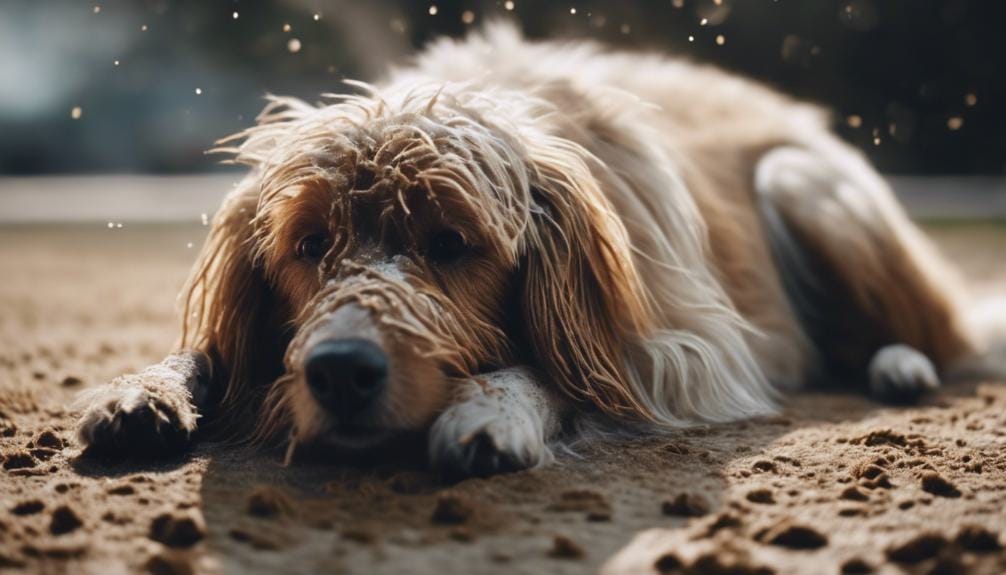Is Chlorine Bad for Dogs' Fur? Understanding Potential Effects
Imagine your dog's fur as a delicate tapestry, each strand a vital thread in their beauty and health. Now, picture the impact of chlorine on this intricate masterpiece.
Are you aware of how this common pool chemical can affect your furry companion's fur? The potential effects may surprise you and prompt you to take proactive steps to safeguard your dog's coat.
Key Takeaways
- Chlorine exposure can lead to dryness, brittleness, and dullness in a dog's fur.
- Prolonged exposure may cause hair loss, rough texture, and skin irritation.
- Proper rinsing and conditioning can prevent adverse effects on the fur.
- Limiting swimming time and maintaining skin health post-swim are crucial for dogs' fur.
Potential Effects of Chlorine on Dog Fur
Exposure to chlorine can have detrimental effects on your dog's fur, potentially leading to dryness, brittleness, and dullness over time. When your furry friend spends significant time in chlorinated water, their coat may become dry and lose its natural shine. Prolonged exposure to chlorine can even result in hair loss or a rough texture, making your dog's coat less lustrous and more prone to damage. Additionally, the dryness caused by chlorine may not only affect the fur but also the skin underneath, increasing the risk of irritation and discomfort for your pup.
To ensure your dog's fur stays healthy despite swimming in chlorinated pools, it's crucial to rinse them thoroughly after each session. Proper conditioning can also help restore moisture and maintain the natural oils in their coat, preventing dryness and brittleness. By taking these simple yet essential steps, you can protect your dog from the negative effects of chlorine on their fur and keep them looking and feeling their best.
Impact of Chlorine on Dog Skin
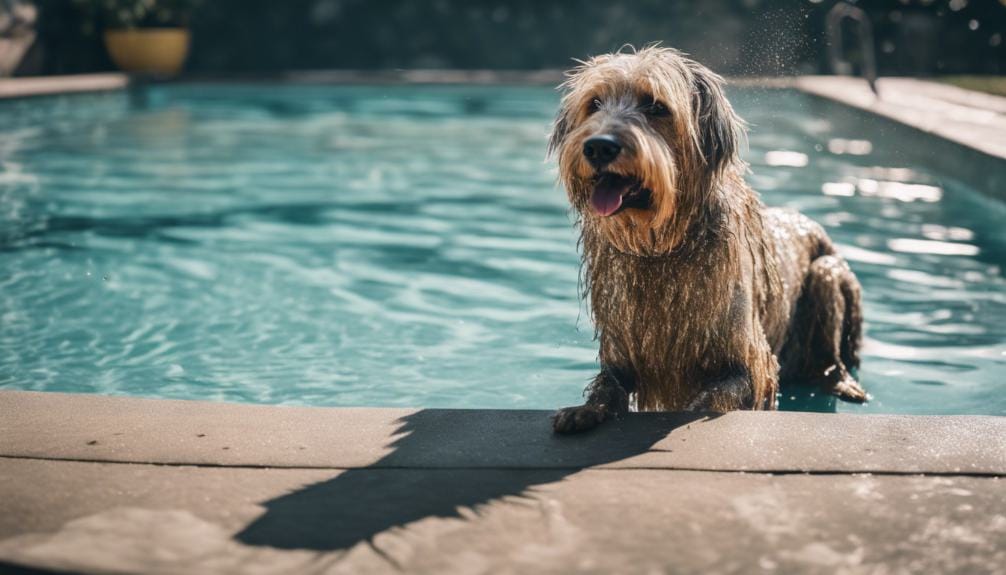
Diving into chlorinated pools can leave your furry companion's skin feeling dry and itchy, a common consequence of chlorine exposure for dogs. The chlorine levels in pool water can strip away the natural oils from your dog's skin, leading to irritation, redness, and even flakiness, especially in dogs with sensitive skin. The presence of chlorine and other pool chemicals can have a drying effect on your dog's skin, causing discomfort after a swim.
To mitigate these effects, it's essential to rinse your dog with fresh water after swimming to help remove any chlorine residue from their fur. Additionally, regular conditioning of your dog's coat can help counteract the drying effects of chlorine, keeping their skin healthy and moisturized. By taking these simple steps, you can ensure that your furry friend enjoys their pool time without suffering from the negative impacts of chlorine exposure on their skin.
Risks of Chlorine Exposure for Dogs
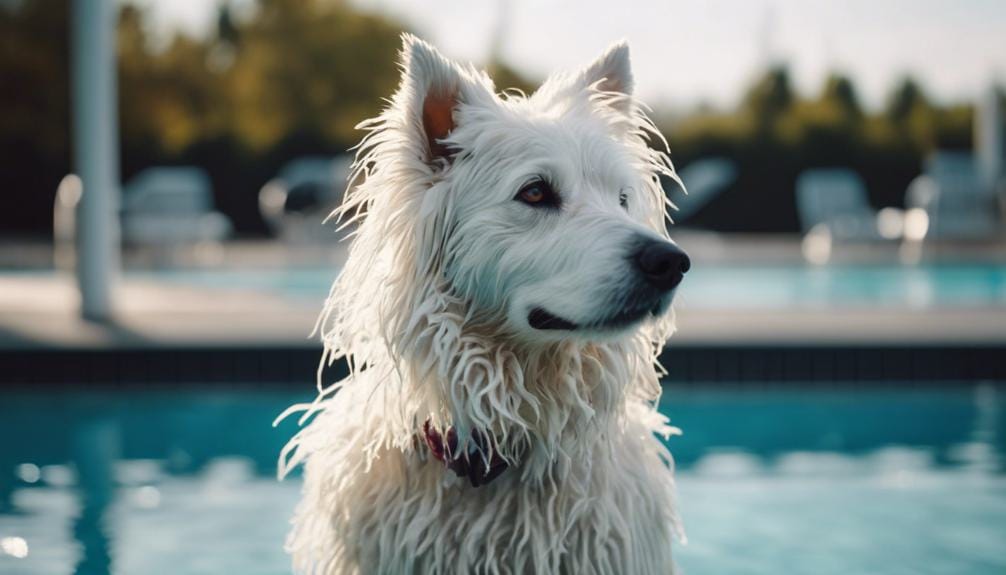
After learning about the impact of chlorine on your dog's skin, it's crucial to understand the risks associated with chlorine exposure for your furry companion's fur.
- Dryness: Chlorine exposure can dry out your dog's coat, making it brittle and dull.
- Skin Irritation: Prolonged exposure to chlorinated water may lead to minor skin irritation in dogs.
- Hair and Skin Issues: Dry skin and fur from chlorine exposure could result in scratching, hair loss, or skin infections.
- Swimming Concerns: Limiting swimming time and rinsing with fresh water can help prevent adverse effects on your dog's fur.
- Coat Conditioning: Occasionally conditioning your dog's fur can maintain moisture levels and enhance the health of their coat.
Understanding these risks can help you take proactive steps to protect your dog's fur from the potential negative effects of chlorine exposure. By being aware of these dangers, you can ensure that your furry friend's coat remains healthy and vibrant.
Understanding Chlorine's Effects on Dog Grooming
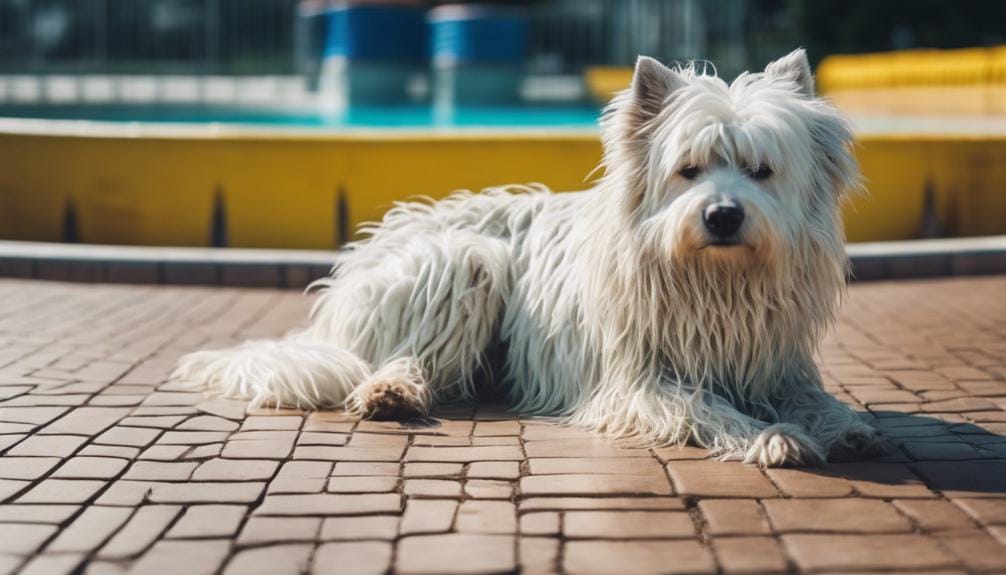
Discover how chlorine impacts the grooming routine for your furry companion, affecting their coat's health and appearance. Chlorine, commonly found in pools, can strip the natural oils from your dog's coat, leading to dry skin and dull fur. Prolonged exposure to chlorinated water may even cause minor skin irritation, resulting in scratching, hair loss, or skin infections.
To combat these effects, it's essential to limit your dog's swimming time and rinse them with fresh water after a dip in the pool. Additionally, occasional conditioning can help counteract the drying effects of chlorine on your dog's coat. By taking these steps, you can ensure that your dog's fur health is maintained, keeping them looking and feeling their best despite exposure to chlorine.
How to Protect Your Dog's Fur From Chlorine
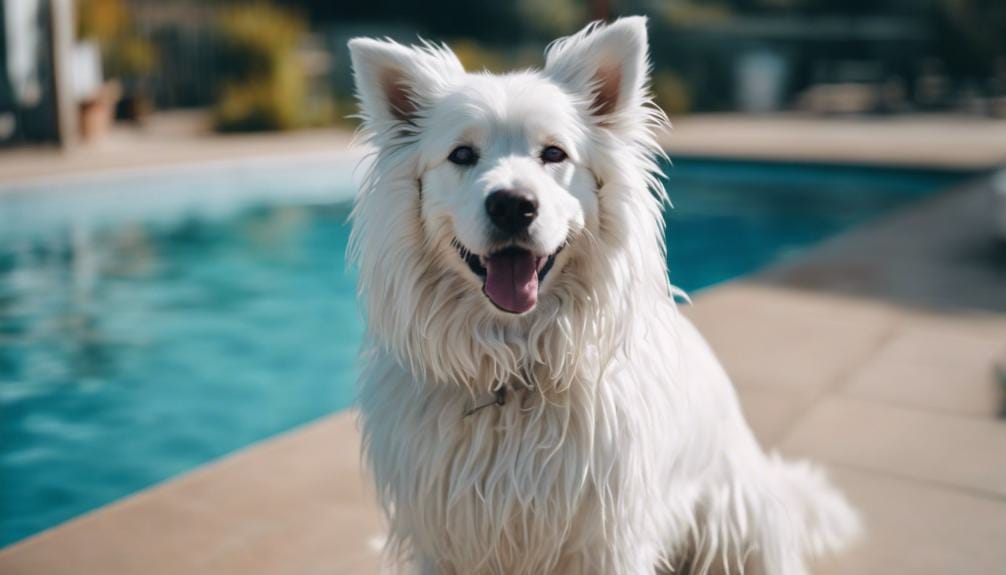
To safeguard your dog's fur from the damaging effects of chlorine, consider rinsing them thoroughly with fresh water after any exposure to chlorinated environments. Here are some tips to protect your pet's fur and keep it healthy after a swim in a pool:
- Use dog-friendly shampoo and conditioner: Opt for products specifically formulated for dogs to help maintain the health and shine of their fur post-swim.
- Regularly brush your dog's fur: Brushing can prevent matting and dryness caused by chlorine exposure, keeping their fur smooth and tangle-free.
- Provide a balanced diet: Ensure your pet's diet includes essential nutrients like omega-3 fatty acids, promoting healthy fur growth and texture.
- Limit exposure to chlorinated water: Minimize your dog's time in chlorinated pools to reduce the risk of fur damage.
- Practice proper post-swim care: Rinse your dog with fresh water, use appropriate grooming products, and monitor their fur's health to address any issues promptly.
Frequently Asked Questions
Does Chlorine Affect Dogs Fur?
Chlorine affects dogs' fur by drying it out, potentially causing brittleness, dullness, and hair loss. To prevent these effects, limit exposure, rinse with fresh water, and condition regularly for healthy fur.
Is It OK for Dogs to Go in Chlorine Pools?
You can let your dog swim in chlorine pools if the water is well-maintained. Keep an eye on their skin and fur for irritation. Limit their time in the pool, rinse them after, and provide post-swim care for healthy fur.
Can Chlorine Cause Hair Loss in Dogs?
Chlorine in pool water can lead to hair loss in dogs, especially with prolonged exposure. Proper rinsing and conditioning post-swim are essential to prevent dryness and brittleness. Take care to protect your furry friend's coat!
What Does Chlorine Do for Animals?
Chlorine in pools helps keep animals safe by killing harmful bacteria and preventing waterborne diseases. Properly balanced levels maintain a clean environment. Regular maintenance is vital. Controlled exposure is safe for skin and fur.
Conclusion
So, remember to take care of your furry friend's skin and coat when they're exposed to chlorine. Keep an eye out for any signs of irritation or dryness, and make sure to rinse them off with fresh water after swimming.
Consider using a conditioner to help keep their fur healthy and shiny. Your dog will thank you for the extra care and attention!

